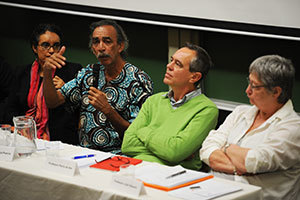Anti-gay laws under fire at Big African Debate
22 May 2014 | Story by Newsroom
The 2014 Big African Debate '“ a headline Africa Month event '“ examined the space where sexuality and the law collide, in light of oppressive anti-gay laws passed in Nigeria and Uganda earlier this year.
Deputy Vice-Chancellor Professor Thandabantu Nhlapo observed that each year the subject for the Big African Debate seemed to "choose itself". Last year speakers reflected on the legacy of award-winning African author Chinua Achebe in the wake of his death. The previous year the topic was African culture and human rights, a subject that flowed from the controversy surrounding The Spear '“ Brett Murray's portrait of President Jacob Zuma. The inaugural debate in 2011 was on African studies in a post-colonial university, a hot topic on campus at the time.
Adewale Maja-Pearce, a Nigerian intellectual, slammed politicians from his home country for stigmatising lesbians, gays, bisexuals, transsexuals and intersex individuals (LGBTI) to "divert attention from their own moral turpitude. In the process they leverage on reactionary social attitudes encouraged by both Christian and Muslim leaders, (who are) united in a common cause with the politicians to exercise power over the gullible".
He believes Nigerian President Goodluck Jonathan signed the Same Sex Marriage Prohibition Act into law in January to "appease a hostile constituency".
"There's no doubt that the only people who have bothered with (the law) are Muslims in the north. As it happens, the president is a Christian southerner, whom the north has vowed to unseat come the 2015 elections," explained Maja-Pearce.
Professor Julie Stewart from the Faculty of Law at the University of Zimbabwe supported this view, adding, "Politicians are often into overt political agendas, whether they believe in something or not".
Strategic, ethical and practical challenges
Professor Pierre de Vos, who holds the Claude Leon Foundation Chair in Constitutional Governance, argued that although human rights can be used to protect and promote LGBTI rights, there are challenges.
"There are very difficult strategic, ethical and practical challenges that confront us when we want to invoke a human rights paradigm to challenge homophobia in Africa. Human rights are often demonised effectively as imposing certain laws and certain standards that come from the West, which after all colonised our continent."
Dr Barbara Boswell from the Young Women's Sexual and Reproductive Health Rights Leadership Project at the African Gender Institute argued that authorities' attempts to control the sexuality of women and members of the LGBTI community are two sides of the same coin. "It's not surprising that anti-homosexuality laws are often coupled with so-called decency laws that overwhelmingly target women and regulate women's bodies ' The hatred of gay men can be viewed as the hatred of the feminine in gay men.
"Looking at these laws through the lens of the hatred of femininity provides fertile ground for coalition-building and joint activism by women's movement and LGBTI rights activists in Africa. Unfortunately feminist spaces in Africa have not always been the most welcoming spaces for queer people."
As in previous years the papers presented at the Big African Debate will be published in a monograph. Nhlapo assured the audience it will undergo a peer-review process before publication and its launch at next year's debate.
Story by Abigail Calata. Image by Michael Hammond.
 This work is licensed under a Creative Commons Attribution-NoDerivatives 4.0 International License.
This work is licensed under a Creative Commons Attribution-NoDerivatives 4.0 International License.
Please view the republishing articles page for more information.










